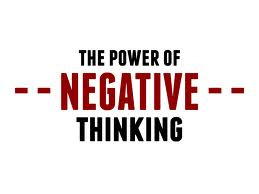

led off intermittently, the fiction is sustained that Truth is one and only the paths vary.
Negative thinking appears to be more prevalent than positive thinking. It seems that with most people positive thinking requires some effort, whereas negative thinking comes easily and uninvited. The power of negative thinking, denotes that there is no such thing as negative feeling, thought or action. What one perceives as negative emotion or feeling is actually a protective feeling or emotion. The negative label, blocks us from seeing our (guilt, hatred, depression, fear and despair) protective and deeper alerting functions. Our fears, allergies, hates, outbursts, withdrawals and evasions are manifestations of our need to protect ourselves from rejection and humiliation. They are not negative; they are our shields and warning systems.
If you didn't know any better, you might say we're a country that preaches optimism. But foreigners employ a calculated form of negative thinking called defensive pessimism, that can lead to very positive results. Defensive pessimism is a strategy used in specific situations to manage anxiety, fear, and worry. Defensive pessimists, prepare for a situation by setting low expectations for themselves, then follow up with a very detailed assessment of everything that may go wrong. Once they've imagined the full range of bad outcomes, they start figuring out how they'll handle them, and that gives them a sense of control.
Many Psychotherapists encourage us to indulge our full range of emotions because each emotion has something to teach us. Each emotion thus plays a critical role in our progress and mind-body healing process.Accepting rather than rejecting a negative emotion takes the edge off its destructive power. If you live the emotion, you will be relieved of it and it may even help you. Psychotherapist Greenspan suggests we think of emotions as teachers. Sorrow teaches us about interconnectedness. Fear is a survival instinct. And anger indicates that something’s wrong that must be made right.
To this I would add, "envy teaches us that we need to better ourselves; disappointment tells us our expectations are unrealistic or that we need to increase our own efforts; frustration tells us we are bored with present circumstances and it’s time for a change". Being stressed means we need to list our priorities; loneliness tells us we need to be connected; guilt tells us we have been unjust to someone or something and need to make amends.
The value of victory is half a grain; the value of defeat is that of a diamond.That is the power of negative reasoning at its most potent and wise.Positive emotion comes from negative emotion all the time. We are all looking for reconciliation, a catharsis. This is how the darker emotions help motivate people to action and allow them to heal.
No comments:
Post a Comment